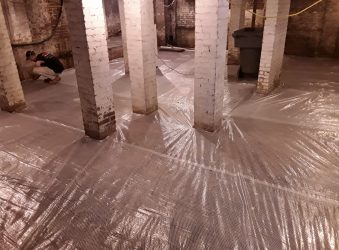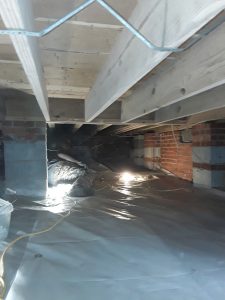
VAPOR BARRIERS: A HIDDEN HERO FOR CHARLOTTE HOMES
When it comes to taking good care of your home, there are many elements that one might see and think of as the star of the show. It might be...
When it comes to taking good care of your home, there are many elements that one might see and think of as the star of the show. It might be painting, replacing siding, or building a deck. While these are all great ideas, there are some “unsung heroes” that are often overlooked which lends to making your home safer and more secure – one of these heroes are crawlspace vapor barriers.
The vapor barrier, aka moisture barriers or vapor diffusion retarders, is used to minimize the diffusion of moisture through a wall, ceiling, crawl space, basement, slab-on-grade foundation, or floor. It may be made from a thin plastic or foil sheeting, although it can also be made from thicker materials such as rigid foam insulation and is recommended for most residential, business, commercial, and educational buildings but not necessarily special use locations such as spas, indoor pools, museums, hospitals, data processing locations and other engineered enclosures such as factories or utility enclosures.
 As a Charlotte, NC homeowner, a great way to protect your investment is by seeing that your home’s vapor barrier is maintained and installed correctly. By doing this, you can be sure your home’s foundation and crawlspace is protected from excess moisture. Ideally, a vapor moisture barrier will be installed during the building processes of the home, but can be added later on as well. If you are unsure if your home’s vapor barrier is working effectively, you may want to consider an energy audit to first determine if there may be an issue.
As a Charlotte, NC homeowner, a great way to protect your investment is by seeing that your home’s vapor barrier is maintained and installed correctly. By doing this, you can be sure your home’s foundation and crawlspace is protected from excess moisture. Ideally, a vapor moisture barrier will be installed during the building processes of the home, but can be added later on as well. If you are unsure if your home’s vapor barrier is working effectively, you may want to consider an energy audit to first determine if there may be an issue.
There are 3 classes of vapor barriers – each of these provide a different level of permeability. If you are building a home and are unsure as to what is best, be sure to talk to your builder or a Sherrill Structural Repairs associate before making a decision. The three types and materials include, are:
- Class 1 (less than .1 permeability) – Glass, sheet metal and polyethylene sheeting
- Class 2 (between 1 and .1 permeability) – Asphalt coated paper, plywood, bitumen coated craft paper
- Class 3 (Between 10 and 1 permeability) – Gypsum board, fiberglass insulation, cellulose insulation, board lumber, brick and house wrap
ADVANTAGES OF HAVING A VAPOR BARRIER FOR YOUR HOME
Other than simply preventing moisture buildup and minimizing rot and mold, there are several other advantages to having a vapor barrier. Here are but a few:
- Minimize the seeping in of bad smells or mold from the outdoors.
- Lower energy costs. Damp soil in the crawl space can cause the home to become hotter or cooler depending on the season. Having a vapor barrier regulates the temperature and keep your home more comfortable.
- Protect your crawl space pipes from rotting, and eventual bursting, thus lengthening the lifespan of your home’s plumbing system.
Don’t overlook this hidden hero of home maintenance. If you are in need of a vapor barrier for the home you are building, or perhaps need to upgrade your existing vapor diffusion retarders, then give the Charlotte, NC Sherrill Structural Repairs team a call today to schedule an assessment. We can’t wait to help you!



